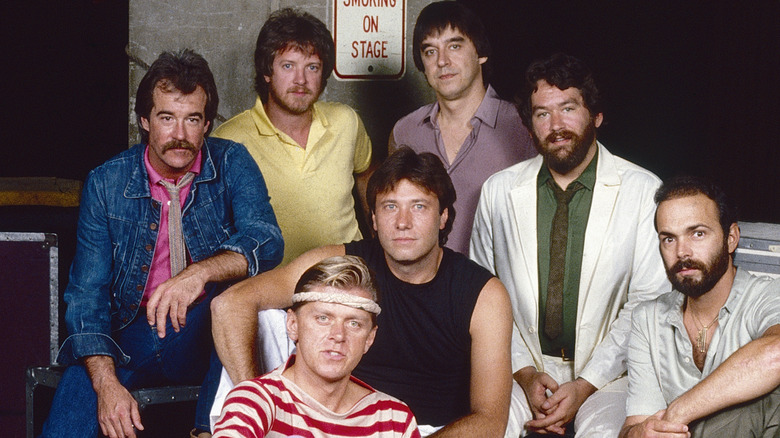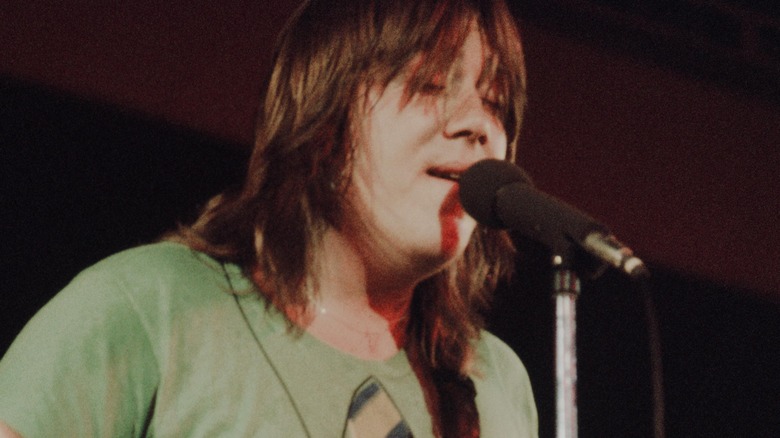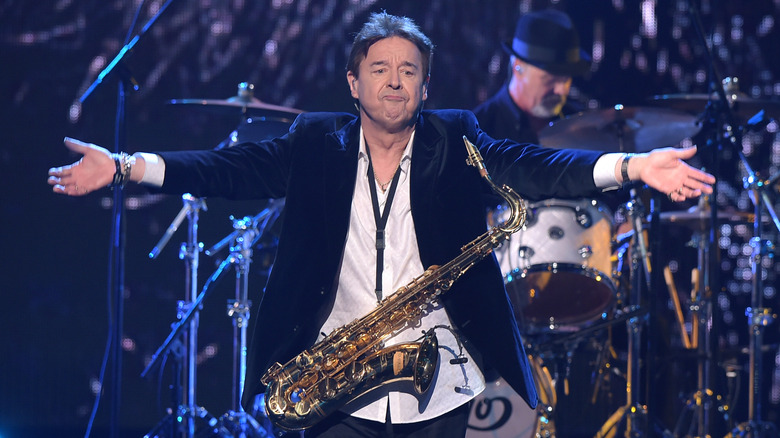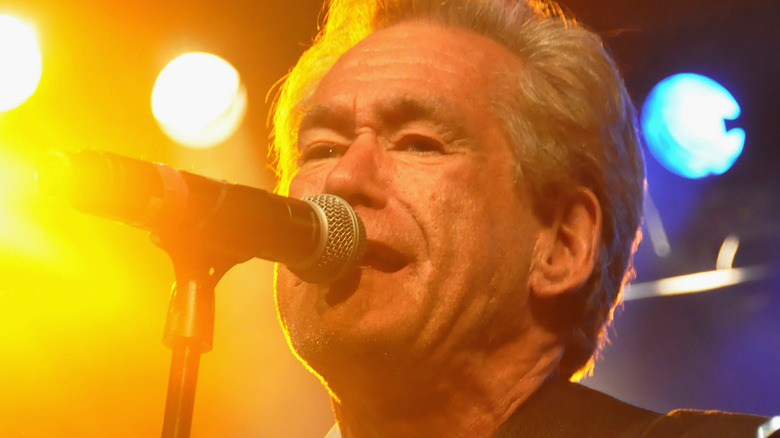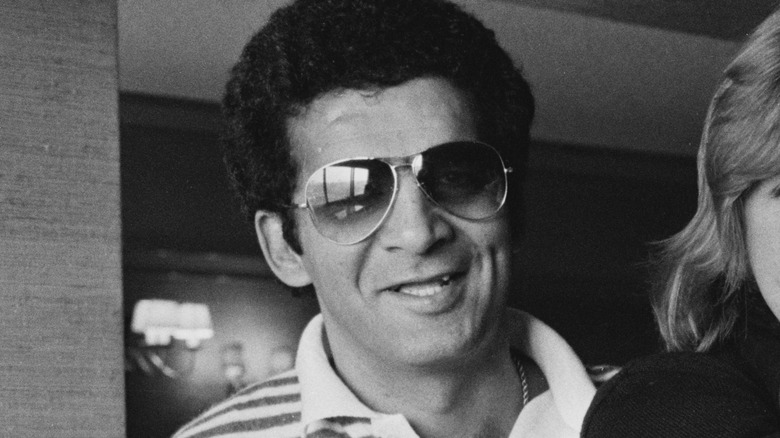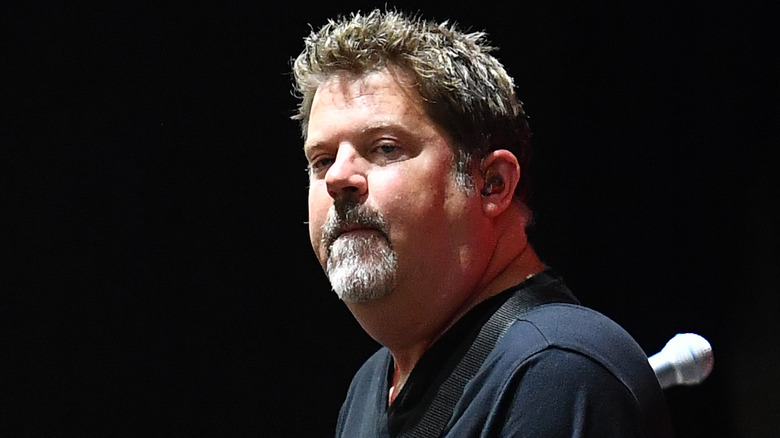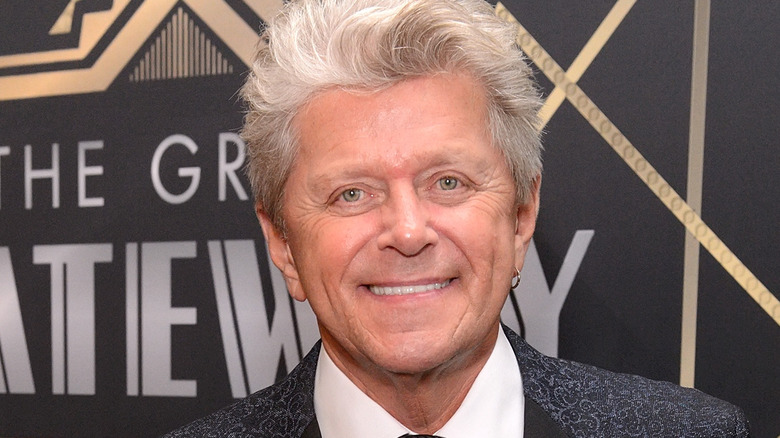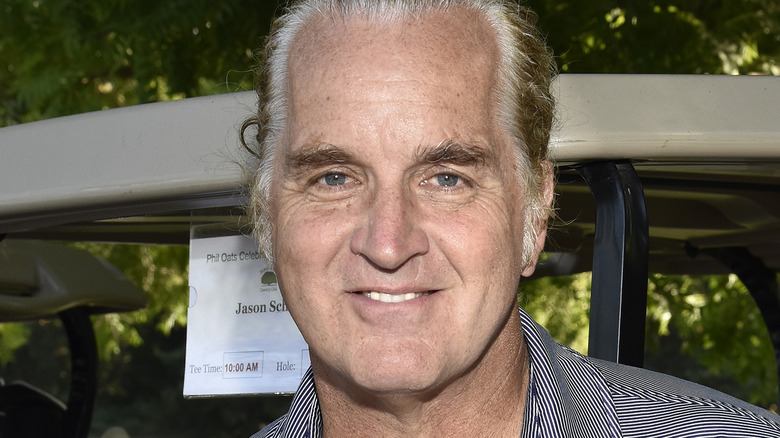The Tragic Real-Life Story Of Chicago
If there's one consistency in the ever-changing, constantly evolving, half-century-plus-spanning history of the band Chicago, it's tragedy. Formed in the 1960s as Chicago Transit Authority, a progressive-psychedelic-freeform rock band notable and unique for its powerful horn section, Chicago would churn out classic rock standards like "Saturday in the Park" and "25 or 6 to 4" before turning into a slick, keyboards-and-ballads band in the '80s, scoring massive hits like "You're the Inspiration," "Hard to Say I'm Sorry," and "Look Away."
The hits dried up in the '90s, but the band would survive into the 21st century as a touring act. Throughout every stage of its existence, the members of Chicago have faced and weathered dramatic lineup changes, combative and creative differences, and all manner of unspeakable personal tragedy, including death, disease, limiting health issues, and accidents. Here's how Chicago endured for so long, and exactly what horrible things came its way.
Terry Kath's violent and accidental death
Terry Kath was a founding member of Chicago, playing hard-charging guitar on the band's first 11 albums. While not always the frontman, Kath helped form the band's sound and identity. "Terry really drove the band rhythmically," bandmate Robert Lamm told the Chicago Tribune. "His importance to this band could never be underestimated." The tragic death of Kath devastated Chicago, both professionally and personally.
Kath attended a party at the home of Chicago road crew member Don Johnson. After a day of drinking, and after all the other guests had left, Kath brought out the handgun he regularly kept on his person. He started to spin it around and play with it, to the consternation of Johnson. "Don't worry, it's not loaded, see?" Kath reportedly quipped, according to The New York Times, before placing the firearm to his head and squeezing the trigger. There had been a bullet in the chamber, however. It entered Kath's brain and instantly killed him. The rock star was 32 years old.
Health problems forced Walt Parazaider out of Chicago
Chicago's multi-instrumentalist Walt Parazaider turned in one of the longest tenures with a single band in rock music history. In 1967, he teamed up with a few fellow music students from DePaul University and formed what would become Chicago (although it was briefly named Chicago Transit Authority). One of just a few founding members who'd stick with the group for as long as possible, Parazaider played saxophone and flute in Chicago for 50 years. However, he retired from playing live with Chicago in 2017 because of a serious heart ailment.
Any hope of ever returning to Chicago would fade, owing to another health issue. In April 2021, Parazaider wrote a news post on Chicago's website announcing that he'd been diagnosed with Alzheimer's disease, a progressive neurological disease that impedes movement and is characterized by severe memory loss and confusion (via WebMD).
Cancer hit Bill Champlin's family hard
In the late 1960s, Bill Champlin formed the San Francisco-based rock-and-horns band Sons of Champlin, and in 1981 took his guitar, keyboards, and voice to the similar Chicago right when it was evolving into a mainstream pop band. Champlin stayed with Chicago until 2009, later joining with fellow band exile Danny Seraphine in California Transit Authority, which played a series of cancer research and treatment benefit concerts in 2018. The cause was personally important to Champlin.
In 2014, Champlin's son, musician Brad Champlin, was diagnosed with esophageal cancer. Two years later, he died at age 51. "It was devastating. You don't want to outlive your kids," Bill Champlin told the Marin Independent Journal. Just one day before his son's death, Bill Champlin received his own cancer diagnosis. Already in mourning, he spent a year away from music to treat advanced-stage cancer, including radiation and chemotherapy regimens and surgery.
Laudir de Oliveira died onstage
Percussionist Laudir de Oliveira was born and raised in Brazil and got a big break when he joined the troupe headed by globally popular bandleader Sergio Mendes in the mid-1960s. Following a move to the United States, he played on Joe Cocker's hit "Feelin' Alright," and when Chicago was looking to incorporate South American musical traditions into its sound, it invited the percussionist to play on "Chicago VI" and "Chicago VII," and thereafter made him an official member. When Chicago went fully pop in 1982, de Oliveira was dismissed and returned to Brazil, resuming his career as a session musician and sideman for a variety of artists.
By September 2017, he was regularly playing alongside Brazilian musician Jovi Joviniano. At a September 2017 show, according to Joviniano, speaking to O Globo, de Oliveira played a long and complicated conga solo at the end of a song called "Fibra." When the next song started up, Joviniano noticed the lack of conga and looked over and saw de Oliveira face down on his instrument. Pronounced dead at the scene, de Oliveira was 77 years old.
Medical issues forced Keith Howland to leave the band
In 1995, session guitarist Keith Howland joined Chicago, playing on records and on its regular concert tours as it segued from hitmakers into a legacy, play-the-old-songs act. In a band with a consistently changing membership that allowed it to continue for more than 50 years, Howland wound up the longest-serving guitarist in Chicago's lengthy history. It all came to an abrupt end 26 years later.
Just before taking the stage for a concert in Louisville, Kentucky, in November 2021, Howland suffered an accident that left his arm so broken that he was unable to play guitar that night and for the foreseeable future. A replacement played with Chicago for the band's remaining tour dates, but after the announcement of a 2022 tour, Howland bowed out. "I have given serious thought in the last few weeks and honestly as to what my future might look like," Howland said in a private Facebook post. "I can't play the guitar right now, and it's probably going to be several months before I can get back to anything normal."
Peter Cetera almost died in a motorcycle accident
Over its first two decades or so, Peter Cetera was the breakout star of Chicago. Primarily a bass player, he also took lead vocal duties on some of the band's best-known songs, including "25 or 6 to 4" and "If You Leave Me Now." In 1985, he left the band to pursue a very successful career as a soft rock balladeer.
In July 1995, after moving to a new record label and recording his fifth studio album and preparing a tour, Cetera was involved in a severe vehicular crash. "I got in this pretty serious motorcycle accident," he told the Los Angeles Times. "I had 60 stitches in my face, and I spent the next two to three months I was originally going to go on the road just sort of wondering what my face was going to look like." Cetera recalled traveling at about 55 miles per hour on his motorcycle when the crash occurred. "I have a couple of manly-man scars now, but I'm lucky to be alive."
Jason Scheff battled substance dependency
Following the departure of Peter Cetera in 1985, 23-year-old Jason Scheff joined Chicago, instantly taking on the role of main lead singer of a band with two decades of history and a huge fanbase. At the same time, Scheff was grappling with what he'd referred to as "youthful bad habits," as per The Saratogian – chiefly a dependency on alcohol that he picked up while upset about long stretches of unemployment. But when he made it into Chicago, he found that he was still drinking heavily and to a point where it affected his life. Less than a year after joining Chicago, Scheff told his bandmates mid-tour he needed to take a break to seek treatment. "I checked myself into rehab in 1986 because I knew I needed help," he told the Santa Clarita Valley Signal.
Members of Chicago were hesitant to let Scheff go. "They said, 'Are you sure? That's pretty drastic. Maybe just go to some meetings or do something when you get home,'" he recalled to The Saratogian. Scheff entered treatment anyway, and the band allowed the hiatus. Scheff remained in Chicago until 2016, and according to his blog, he's never had a relapse into substance abuse.
